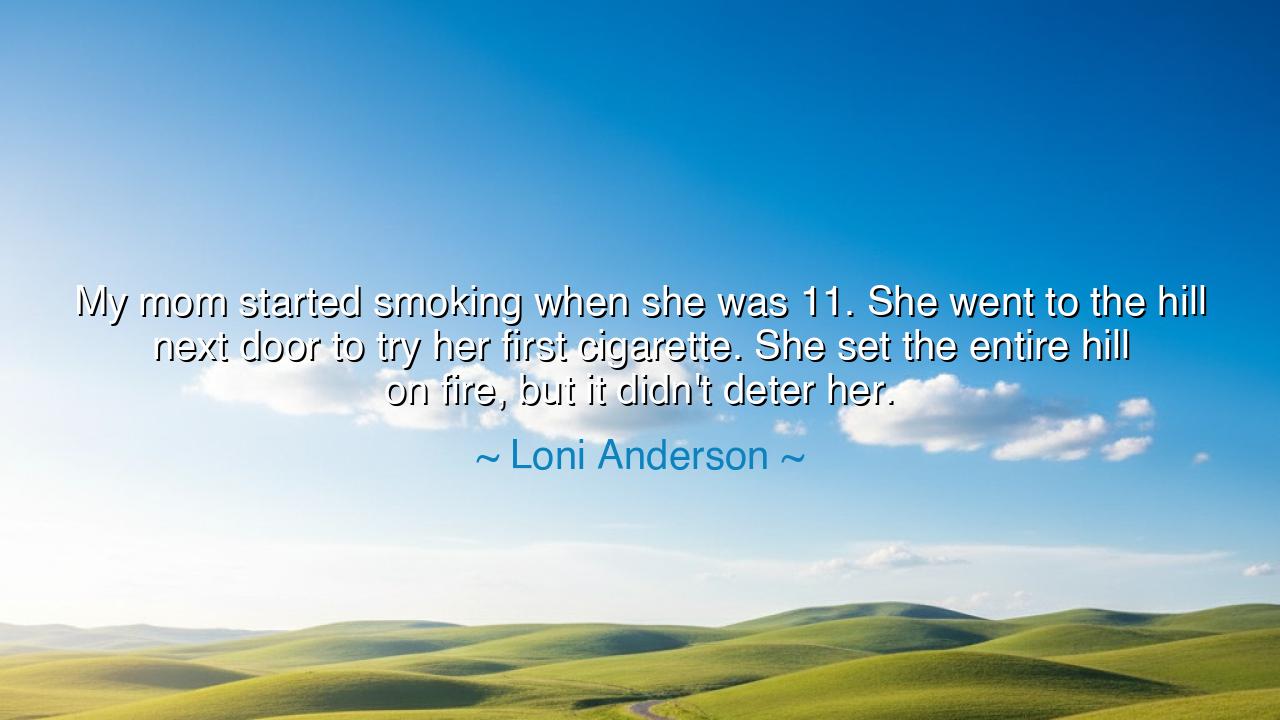
My mom started smoking when she was 11. She went to the hill next
My mom started smoking when she was 11. She went to the hill next door to try her first cigarette. She set the entire hill on fire, but it didn't deter her.






When Loni Anderson said, “My mom started smoking when she was 11. She went to the hill next door to try her first cigarette. She set the entire hill on fire, but it didn't deter her,” she spoke not only with humor, but with an undertone of irony and insight — for within her story lies a meditation on human stubbornness, temptation, and the strange persistence of desire. Beneath the playful image of a young girl and her accidental blaze lies a timeless truth: that even when our first encounter with danger burns us, we often return to it, drawn by the flame rather than warned by it. This is not only a tale of cigarettes and smoke — it is a parable of the human heart.
The ancients would have recognized this story as one of symbolic fire. Fire, to them, was both sacred and perilous — the gift of the gods and the destroyer of worlds. Prometheus himself stole it from Olympus, giving humanity light, warmth, and power, but also suffering, for with every spark comes responsibility. Anderson’s mother, as a young girl, was playing with that same elemental force — both literally and spiritually. She sought a forbidden thrill, a taste of adulthood, and in doing so unleashed chaos upon the world around her. The hill aflame becomes a vivid metaphor for the way small rebellions can ignite vast consequences — and yet, despite the devastation, the fire within her will to continue burned stronger still.
This duality — the fire that destroys and the fire that drives — lives in every human being. Even the wisest among us are often drawn to the very things that hurt us, returning to them with stubbornness, as if daring fate to teach the lesson one more time. Anderson’s mother was not deterred, just as many throughout history have not been deterred by their own mistakes. Consider the story of Icarus, who, warned not to fly too close to the sun, still rose higher and higher until his wings melted and he fell into the sea. His flight was reckless, but also magnificent. Like the girl on the hill, Icarus chose experience over obedience, the thrill of danger over the safety of wisdom. In that, he embodied the eternal conflict between curiosity and caution — between the will to live fully and the wisdom to live safely.
And yet, there is humor in Anderson’s retelling — the humor of distance, of hindsight, of the child who has grown to see her mother’s flaws with compassion rather than judgment. It is the laughter that comes not from mockery, but from understanding: that all humans are shaped by their contradictions. Her mother’s act may seem foolish, but within it lies a kind of fearless spirit, a refusal to be defined by failure. The same willpower that once made her light a forbidden cigarette might, in other moments, have given her the strength to endure hardship, raise a child, or face the world’s judgments unflinchingly. What burns destructively in youth may, if tempered by wisdom, become the light that guides in age.
This is the secret the ancients understood: that flaws and strengths are often born from the same fire. The impulsiveness that leads to trouble in one era of life may, in another, become courage. The desire to test boundaries, when shaped by experience, becomes innovation, artistry, leadership. The young girl who set a hill ablaze might one day raise a daughter who burns just as brightly — but with purpose, not accident. In this sense, Loni Anderson’s memory is not a warning against fire, but a reminder that every flame must learn its shape.
From this story we draw a lesson both timeless and practical. Do not despise your own recklessness, nor that of those who came before you. Instead, learn from it. The fires we light in ignorance can either consume us or refine us. To live is to risk, but to grow is to learn from the burn. When temptation whispers — when the cigarette, the ambition, or the forbidden dream calls — pause and ask: Will this flame warm me, or will it devour me? For wisdom is not found in never lighting the match, but in knowing when to put it out.
And so, as the ancients would say, fire is both our curse and our crown. The girl on the hill, the goddess of flame, the dreamer of the sky — all are one spirit in different forms. From her, we learn that the human heart cannot be deterred by fear alone; it must be guided by reflection. Let her story remind us that our inner fires, though dangerous, are also divine. When tended with care and awareness, they cease to destroy and begin to illuminate — lighting the path from recklessness to wisdom, from smoke to clarity, from youth’s wild blaze to the steady light of understanding.






AAdministratorAdministrator
Welcome, honored guests. Please leave a comment, we will respond soon